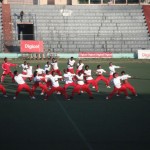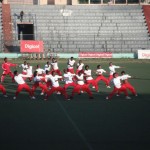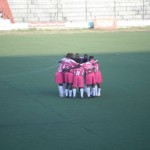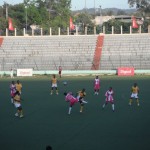While unjust events dominate recent Haitian soccer news on an international scale, there are happier local stories too. Yesterday evening at Stade Sylvio Cator, I watched the final championship game of the two top women’s soccer teams, Valentina and the Tigresses.
My friend Hayana Jean-Francois, formerly the captain of the national U17 team that traveled to Costa Rica in March, is #9 for Valentina. I sat with her teammates from the national team, Madeline Delice (originally from Léogane, plays for Anacaona) and Gerthrude Saint-Jacques (from Cité Soleil, plays for Amazons). Also sitting with us was Hayana’s mother, about whom Hayana has written a little here. Obviously, we were cheering for Valentina. They were only seating people in a portion of the stadium, but that portion was packed, with people even sitting in the aisles. Vendors went up and down the stands, selling beer and cold sodas, plantain chips, peanuts, and conch in spicy vinegar sauce. Photographers crowded the field, taking pictures of the women as they did their warm-ups and stood with their hands over their hearts for the national anthem. Cheerleaders in Digicel red-and-white danced and did some impressive gymnastics while a perplexing Digicel mascot (an anthropomorphized red dot? An overheated person in a foam suit?) bounced around alongside them.
Here are some observations:
1. You do not mess with Haitian soccer fans. The ignorant and gender-biased American onlooker might be inclined to presume that this would be a low-intensity match, since most of the players are teenaged women. The players, in fact, did seem to be very civil with one another – helping one another up after a fall, congratulating one another with sincerity and friendship. The fans, however, were hardcore. Shouting matches ensued between Valentina and Tigresse fans when people said even the most minimally disparaging remark about the opposing team’s players. While in some cultural contexts (I’m talking to you, Eastern Europe), lamentation and deprecation of one’s own team are signs of tough-love fandom (e.g., “We are the worst team ever! The only reason we won is that the other team played so badly!”), this would not fly in Haiti. This might get the daylights kicked out of you in Haiti, actually.
2. You really do not mess with Haitian soccer moms. This is a corollary of Observation #1. When a (somewhat drunk) woman in the row in front of us shouted “Hayana doesn’t know how to play!” Hayana’s mother (who until this point had seemed like nothing more than a pleasant woman in her forties, proudly wearing the badge that gets her into all the Federation games for free) responded with an admirable and seething fury.
3. Last-minute miracles do happen. In the first half, the Tigresses got a goal. “Don’t worry,” Gerthrude assured me. “Valentina will score in the second half.” But as the second half went on, this seemed less and less likely. Valentina appeared to have gotten a goal early on, but it was declared not good. “It seems like Valentina is going to lose…” Gerthrude despaired. As the clock ticked down, Madeline and I sipped a shared beer, resigning ourselves to the inevitable loss. But then – in the last few seconds! – Valentina’s captain, Manoucheka Pierre-Louis, from midfield, scored a goal. The stadium erupted in cheers, for, with the tie, Valentina had clinched their place as the championship winners. “I told you Valentina would win!” shouted Gerthrude. The field became a flurry of pink and white as the players screamed and danced in delight and glory, and hoisted Manoucheka onto their shoulders. As the music blasted, I took Madeline’s hand and made her dance with me. Valentina received a trophy and $10,000 US from Digicel (the Tigresses and the third-place team got smaller trophies and smaller sums). Champagne bottles were shaken and popped as the women were drenched under the stadium lights in the place that once saw Haitian soccer greats like Manno Sanon and Joe Gaetjens play. But last night, the cheers were all for Valentina. It was a happy moment in Port-au-Prince – and it wasn’t about the earthquake, or cholera, or an election, or camps, or violence against women, or any of the other things that make the news and that make Haiti seem like the most impossible, unthinkable place in the world. If there were particularly Haitian aspects of the setting, the snacks, or the fandom, they were all superseded in this moment by what seems, even to this cynical and relativistic anthropologist, to be something that could take place anywhere in the world: the universal glow of suspense, pay-off, and triumph.






